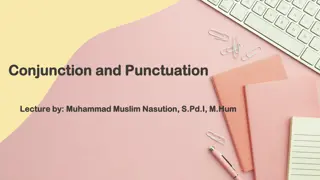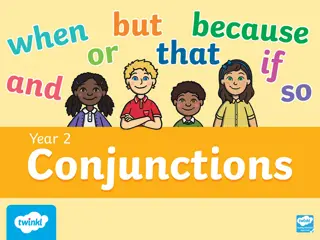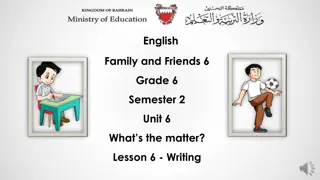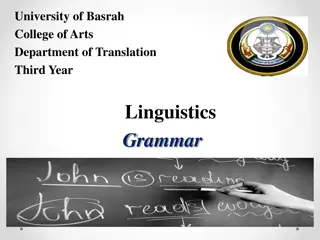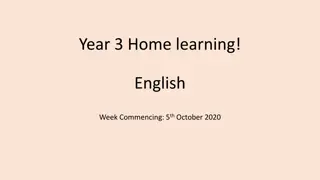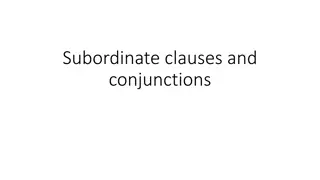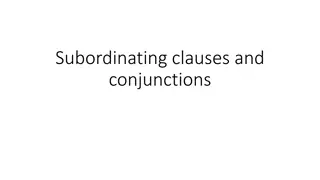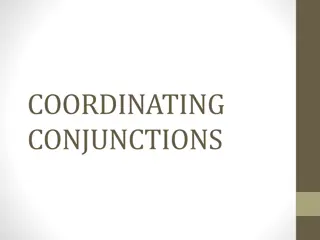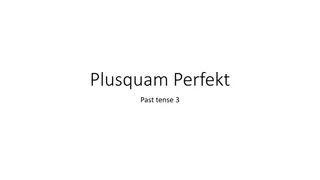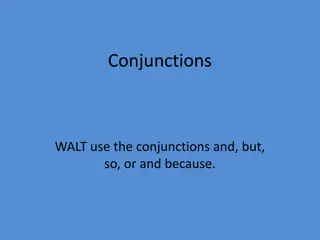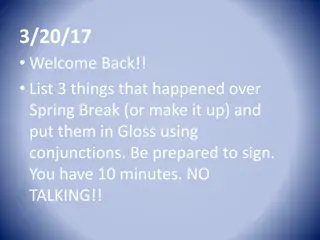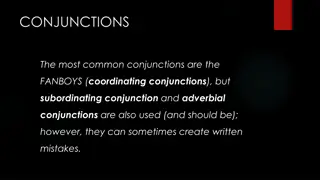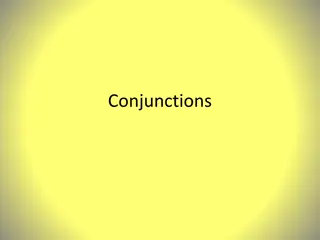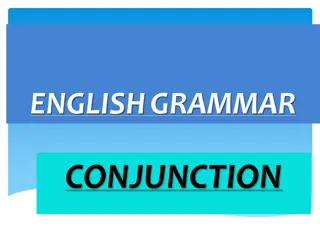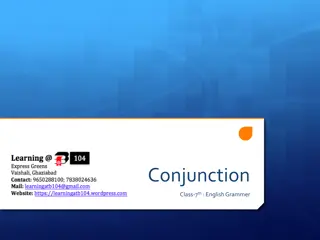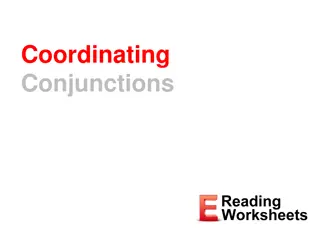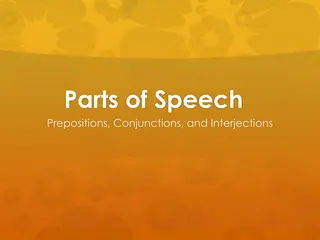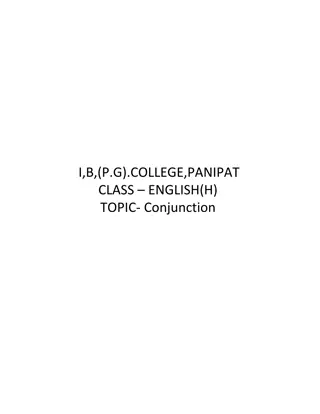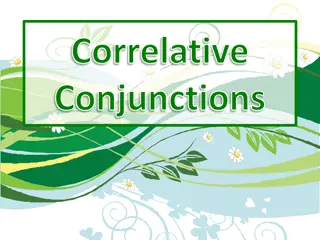Conjunctions: FANBOYS and More
The use of coordinating conjunctions like FANBOYS, adverbial conjunctions, and additional conjunctions in writing. Learn about proper comma placement, differentiating between independent and dependent clauses, and the structure of clauses. Discover how to use conjunctions effectively to enhance your writing style.
Download Presentation

Please find below an Image/Link to download the presentation.
The content on the website is provided AS IS for your information and personal use only. It may not be sold, licensed, or shared on other websites without obtaining consent from the author.If you encounter any issues during the download, it is possible that the publisher has removed the file from their server.
You are allowed to download the files provided on this website for personal or commercial use, subject to the condition that they are used lawfully. All files are the property of their respective owners.
The content on the website is provided AS IS for your information and personal use only. It may not be sold, licensed, or shared on other websites without obtaining consent from the author.
E N D
Presentation Transcript
#10 The use of conjunctions
#10 coordinating conjunctions These are the conjunctions from Grammar Rock they hook up EQUAL parts (words, phrases, clauses). They are the conjunctions we refer to as the FANBOYS.
#10 FANBOYS ----------CONJUNCTION WRITING TIPS AND SUGGESTIONS---------- The mistake kids often make with regards to FANBOYS use is comma placement. It is NOT a rule to always place a comma before and , which is the most common of the FANBOYS. Commas do go before the and when: Using a list of three or more Ex. Bob, Jack, and Phil I went running, skiing, and swimming last week. When connecting two independent clauses (two sentences) Ex. John did all of his homework, but Sue did none of hers. Today had the most pleasant weather, yet tomorrow it calls for rain. \
#10 ADVERBIAL CONJUNCTIONS Adverbial Conjunctions- join complete thoughts (like the FANBOYS) but go further by articulating relationship between ideas/sentences Ex. I like chocolate; he likes vanilla. add an AC, to clarify relationship Ex. I spent all of my money; I can t go to the movies.
#10 HOTSHOTCAT ; however, = nevertheless/ in contrast ; otherwise, = alternatively ; therefore, = for that reason ; similarly, = in the same way ; hence, = same as therefore ; on the other hand, = contrast ; then, = next ; consequently, = as a result ; also, = in addition to ; thus, = as a result Additional adverbial conjunctions include: accordingly, besides, finally, for example, furthermore, in fact, instead, meanwhile, moreover, nevertheless, now, and soon.
#10 HOTSHOTCAT Best used after a semi-colon (when separating sentences) and followed by a comma. If you use a comma, it creates a run- on called a comma splice. The use of AC s allows a writer to create a flow within a paragraph.
TOP TEN #10 an 8th grade review What makes a clause a clause? What differentiates an independent and dependent clause? What is a subordinate conjunction what does subordinate mean? How many of the subordinate conjunctions can you list? What is the structure of IC plus DC called? How are the various ways it s punctuated? Stylistically, why would you choose to use these?
#10 subordinating conjunctions and dependent clauses All clauses contain a subject and a verb. Some are independent (can stand alone) while some are dependent (express an incomplete thought aka fragment).
#10 subordinating conjunctions and dependent clauses A subordinating conjunction (SC) subordinates a clause (makes it less important) then joins it with an independent clause making it a dependent clause.
#10 AAAWWWUUBBIS #10 AAAWWWUUBBIS as although Dependent clauses can often be identified by the use the most common subordinate conjunctions. after when(ever) while whether until unless because before if since
#10 Fragment Mistakes While we as 9th graders do not create elementary level fragments, the misunderstanding of subordinating conjunctions does cause errors to be made. Ex. Provided the teacher scored the essays. Although he had been a decorated soldier during World War II and had fought many battles for the losing cause of liberalism in Congress. Since the beginning of time and because individuals tend to demonstrate selfish tendencies.
#10 subordinating conjunctions and dependent clauses When used/joined together, they create a complex sentence. Dependent clauses may appear at the beginning, middle, or end of a sentence. Depending on how they are joined, punctuation varies.
#10 complex sentences Where would you place the comma in the following example? Since it was raining we decided to go to the movies.
#10 complex sentences Where would you place the comma in the following example? SC Since it was raining, we decided to go to the movies. S V RULE: When a dependent clause is placed at the beginning of a sentence, place a comma between the independent clause and the dependent clause.
#10 complex sentences Where would you place the comma in the following example? We decided to go to the movies because we were bored.
#10 complex sentences Where would you place the comma in the following example? S V We decided to go to the movies because we were bored. SC RULE: When a dependent clause is located after an independent clause, DO NOT place a comma between the two.
#10 complex sentences Where would you place the comma in the following example? Jerry felt since he was old enough he would see the scary movie.
#10 complex sentences Where would you place the comma in the following example? S V SC Jerry felt, since he was old enough, he would see the scary movie. RULE: When a dependent clause is located inside an independent clause, place commas around it.
#10 complex sentences Dependent clauses added to independent clauses in order to help to clarify and/or add detail create conditions. Stylistically, this creates sentence variety a complex sentence (think simple, compound, and complex, as well as compound- complex) Create sophisticated transitions.
#10 complex sentences The use of a DC, IC serves as an example of a sophisticated transition between paragraphs in your writing. Which sounds better? The next reason the book should stay on the summer reading list is its relatable characters. While the historical context provides a unique perspective, the characters are also relatable.


